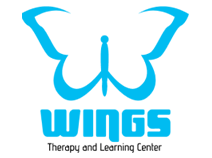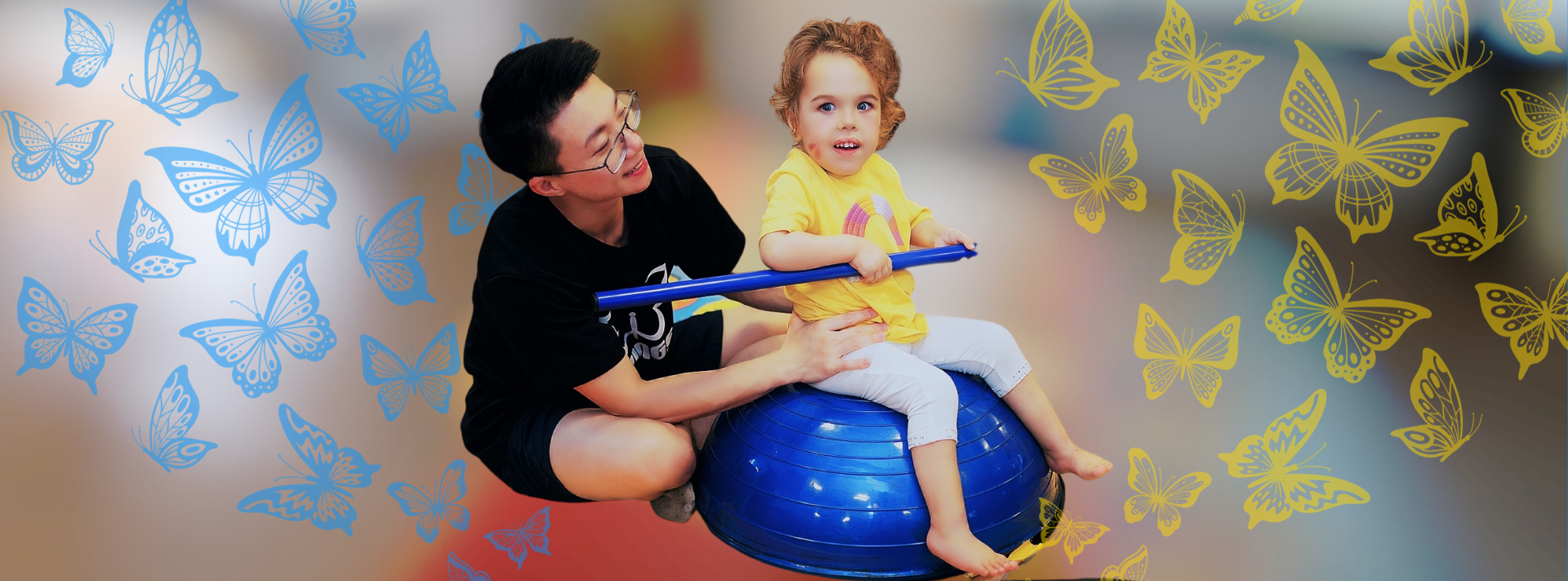
- Home
- Our Programmes
Our Programmes
Unique Needs Require Unique Solutions
Singapore’s First & Only Therapy Center To Operate Under The Intensive Model Of Therapy (IMOT) Framework
IMOT: What’s It All About?
Core to our programs is the IMOT MODEL.
Developed in Poland, the Intensive Model of Therapy (IMOT) is a therapeutic approach to treating children and adults with cerebral palsy and other neurological and movement disorders.
IMOT is popular with patients, therapists, and doctors because of outstanding results.
Many children progress more quickly toward their goals in 3 weeks of intensive therapy than they do in 12 months of ongoing traditional therapy. They often advance to the next developmental skill or higher in a 3-week program. For example, if a child is using a walker, it is not uncommon for them to gain the strength, balance, and ability to walk with crutches in just three weeks.
WINGS therapists utilize the IMOT by treating patients 2-4 hours a day, 5 days a week, for 3 full weeks.
This effective therapy involves performing exercises over an extended period — 5 days a week for 2-4 hours a day typically over a 3-week period. Studies have shown that a 3-week session of intensive therapy helps a child realize the same goals he or she would usually achieve with a full year of traditional therapy. Patients with neuromuscular challenges need this focused and intense approach that provides time to practice the skills they need to learn — like sitting, standing or walking.
Our therapists will create a unique program based on your child’s diagnosis, age and stamina.
Here at WINGS, our intensive therapy programs are geared towards supporting a child’s journey towards independent living. Therapy goals are predominantly focused on achieving milestones in activities of daily living such as balance and coordination, fine and gross motor skills and even being able to carry their own bodyweight in order to sit, stand and walk.
Our highly trained physiotherapists challenge the child in a fun and motivating environment, pushing their performance to achieve new developmental milestones. All of our therapists –physical and occupational—work in partnership and with family members to assess each child’s current functioning level.
A customized plan is developed to help each child achieve optimal results. Our pediatric therapy programs start from as early as 3 months of age right through to young adults.
Core to our programs is the IMOT MODEL.
IMOT is popular with patients, therapists, and doctors because of outstanding results.
Many children progress more quickly toward their goals in 3 weeks of intensive therapy than they do in 12 months of ongoing traditional therapy. They often advance to the next developmental skill or higher in a 3-week program. For example, if a child is using a walker, it is not uncommon for them to gain the strength, balance, and ability to walk with crutches in just three weeks.
WINGS therapists utilize the IMOT by treating patients 2-4 hours a day, 5 days a week, for 3 full weeks.
This effective therapy involves performing exercises over an extended period — 5 days a week for 2-4 hours a day typically over a 3-week period. Studies have shown that a 3-week session of intensive therapy helps a child realize the same goals he or she would usually achieve with a full year of traditional therapy. Patients with neuromuscular challenges need this focused and intense approach that provides time to practice the skills they need to learn — like sitting, standing or walking.
Our therapists will create a unique program based on your child’s diagnosis, age and stamina.
Here at WINGS, our intensive therapy programs are geared towards supporting a child’s journey towards independent living. Therapy goals are predominantly focused on achieving milestones in activities of daily living such as balance and coordination, fine and gross motor skills and even being able to carry their own bodyweight in order to sit, stand and walk.
Our highly trained physiotherapists challenge the child in a fun and motivating environment, pushing their performance to achieve new developmental milestones. All of our therapists –physical and occupational—work in partnership and with family members to assess each child’s current functioning level.
A customized plan is developed to help each child achieve optimal results. Our pediatric therapy programs start from as early as 3 months of age right through to young adults.
Our Specialised Programmes
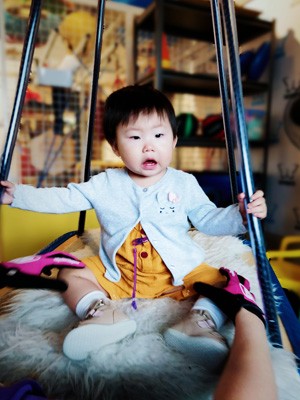
Early Intervention Programme (EIP)
The first three years of a child’s life are the most crucial period for brain development in a child– building the foundation for their adult life. Identification of any developmental delay concerns and addressing those issues early with the appropriate ‘Early Intervention’ therapies such as Physical Therapy and Occupational Therapy will enable the child to reach their highest potential.
At WINGS, we pride ourselves on working closely with parents and caregivers to develop personalised intensive Early Intervention programmes.
Traditional therapies often shy away from goal setting and have a tendency to tell you what your child cannot do…we believe in helping them to achieve what they can.
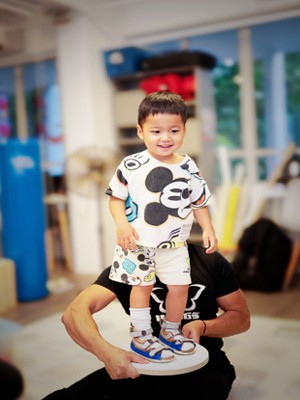
Dynamic Movement Intervention
Dynamic Movement Intervention (DMI) is a technique used to treat children with motor delays by improving automatic reflex pathways and the fight or flight response in the brain when met with gravity, to promote progress towards developmental milestones using these neural pathways as a tool to jumpstart your child’s neuromotor development. This therapy form incorporates current research on neurorehabilitation, technologies, and methodologies. DMI stimulates neuroplasticity to facilitate new neuronal connections and the development of motor milestones.
Whether a child’s condition is mild or severe, children of all abilities benefit from DMI; as it stimulates neuroplasticity in the developing brain.
Children diagnosed with any type of motor delay including conditions such as; Down Syndrome, Cerebral palsy, global developmental delay, hypotonia, chromosomal abnormalities/genetic disorders, spinal cord lesions or acquired brain injury may benefit from this form of therapy. Children at risk, such as those who are born prematurely, can also benefit from this therapy due to the strong neuroplastic changes that this treatment stimulates within the developing brain.
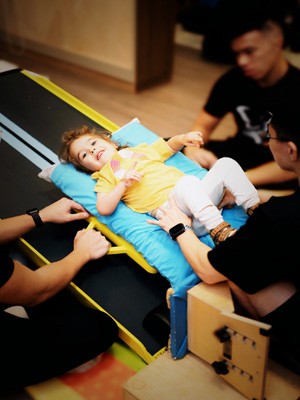
Neurodevelopmental Therapy (NDT)
NDT is a type of physiotherapy treatment which aims to improve movement and mobility in patients with damage to their brain and spinal cord. Many physiotherapists use Bobath in the rehabilitation of patients with neurological conditions to promote the sensory and motor pathways and facilitate normal movement and motor control.
NDT physiotherapists encourage a person to move in the most normal and energy efficient way and prevent abnormal movement patterns in order to:
🦋 Normalise Tone
🦋 Regain Motor Control
🦋 Make Movements Easier To Achieve That Are Precise & Task-Focused
🦋 Improve Posture
🦋 Lengthen Tight Muscles To Help Decrease Spasticity & Reduce Contractures
🦋 Improve Ability With Everyday Activities
🦋 Increase Independence
🦋 Achieve Maximum Potential
The NDT approach also emphasises the importance of early rehabilitation, consistency of practice and a stimulating environment in order to promote recovery.
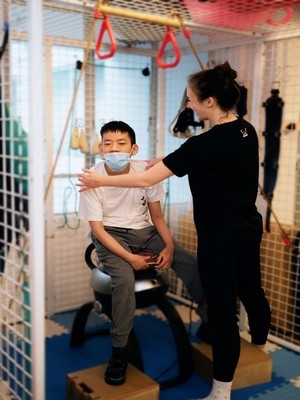
Youth Program (13-25 Year Olds)
- Surgery
- Muscular Atrophy
- Progressive weakening and/or loss of muscle control
- Contractures & Deformities
- Especially important during growth spurts in puberty such as the curvature of the spine, shortening of muscles and tendons or tissues that affect the joints
- Movement
- Pivotal in the health of metabolic functions such as respiration, digestion and the development of a healthy musculoskeletal system
- Improves self-esteem and confidence, as well as social interaction, which is particularly important as your child enters his or her teenage years & young adulthood
- Development of Motor Skills (Fine & Gross) + Activities of Daily Living (ADLs)
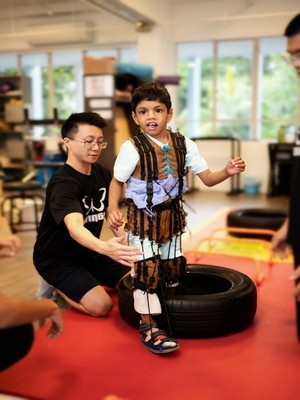
Suit Therapy (Neurosuit™ & Therasuit ®)
Suit Therapy is an intensive neuro-physical therapy programme for Cerebral Palsy and neuro-motor disorders such as: stroke, traumatic brain injuries, spinal cord injuries, neuromuscular disorders, sports injuries and more.
The NeuroSuit or TheraSuit is worn for two-hour periods under the supervision of our highly trained therapists.
While framing the body, the NeuroSuit provides support and resistance simultaneously. It assists the patient’s body to be in correct alignment, while the bungee cords provide a comforting compression to the joints and distribute a vertical weight bearing to the patient’s entire body. This improves proprioception , reduces undesired reflexes, facilitates proper movement and provides additional weight bearing throughout the body. This additional weight bearing provides strong feedback to the brain which helps create new improved patterns of movement such as when walking while the body is maintaining a more upright, correct posture.
Performing specific exercises and functional activities while in the NeuroSuit results in improved motor skills, which carries over into the child’s daily life when they are not in the NeuroSuit
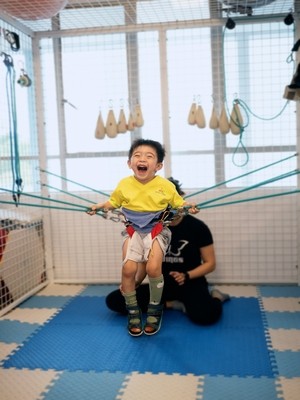
Spider Cage Therapy
Spider Cage Therapy is a rigorous physical therapy approach that involves the mechanical suspension of a child in the middle of a metal cage also known as the Universal Exercise Unit (UEU), with elastic bungee cords of alternating elasticity.
The bungee cords are connected to distinct points on a special therapy belt around the waist, creating what looks like a unique spider web around the child, which gives them vital support and strengthens target areas.
The Spider Cage allows for a child as young as 18 months of age to stand and move independently in a body-weight-supported manner. This facilitates freedom of movement with security and safety. It also increases confidence and independence in performing challenging activities from stepping, transitions (sit to stand, kneeling to stand, step up and down), jumping and treadmill training. The suspension system allows the therapist to perform a series of vestibular movements which is essential for spatial awareness, balance and coordination
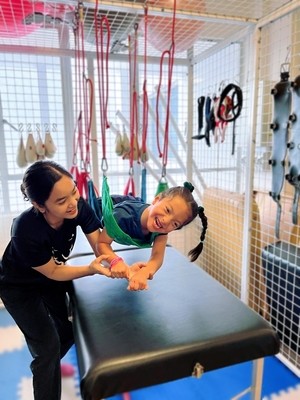
Universal Exercise Unit (UEU)
The Universal Exercise Unit was designed and developed in the 1940s by a well-known orthopedic surgeon, Prof. Dega, in Poland, and is a cage system that works in combination with pulleys, straps, splints, bungees and weights.
This allows the therapist to perform a variety of exercises with the patient. Major goals of these exercises include improvements in strength, AROM (active range of motion) and muscle flexibility. By eliminating gravitational forces, even patients with the weakest muscle strength can initiate movement. The engineering of the UEU also allows the therapist to isolate any muscle group and target it.
The effects of this type of exercise are reflected in functional gains– where quality of gait, balance and coordination of movements increases rapidly. The weights used in the UEU are graded every 0.5lbs or 1lb, which allows the therapist to obtain measurable data and record increased muscular gains in progress reports for patients. This is the entire core of the UEU.
If a patient can perform minimum movements with the assistance of a trained therapist, then he can progress to resistance exercises which move the child toward independent muscular control.

Activities Of Daily Living / Functional Fine & Gross Motor Skills
(Functional Fine & Gross Motor Skills)
Here at WINGS, we believe that a child’s potential is limitless, and that every child deserves a chance to be independent. In addition to our multiple physically-targeted therapies, we now also offer Activities Of Daily Living.
This form of therapy is based on the engagement in meaningful activities of daily life (such as self-care skills, education, work, or social interaction) for patients with special needs to build confidence and self-sufficiency in everyday tasks from chewing to brushing their teeth and learning how to hold a pen to write, to more complex gross motor movements such as putting on pants, using a toilet bowl & stair-climbing.
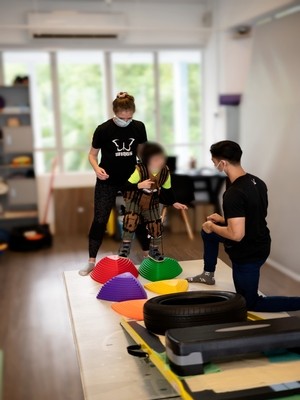
Autism Fitness ®
Our Autism Fitness programs cater to the specific needs of youths with autism.
The goal of our Autism Fitness program is to bring effective, fun, and meaningful fitness and Adaptive Physical Education programs to children and teens on the spectrum, designed to improve fitness, movement (agility, balance, coordination, speed, and endurance), motor skills, cognition and social skills.
The difference between our Adaptive Sports Programme and Autism Fitness Programme is the incorporation of Applied Behavioural Analysis, as well as Sensory Integration Therapy, to support the unique needs of our patients with autism.
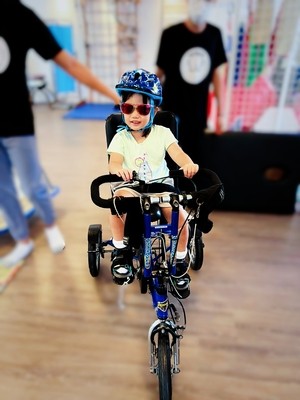
Adaptive Sports
Every child has the right to enjoy the fun of playing sports and to experience the joy of hitting a ball, making a goal, or crossing the finish line, regardless of their ability to move independently.
Given the right help, children with physical disabilities can participate in almost any sport or exercise including cycling, soccer, basketball, dance and so much more.
Our Sports Programmes are also unique to the needs of each child and designed to improve fitness, movement (agility, balance, coordination, speed, and endurance), motor skills, cognition and social skills.
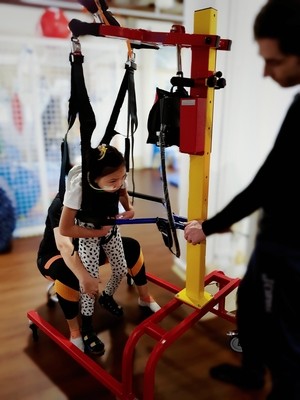
Gait Training with LiteGait ®
At WINGS, we utilize a partial-weight-bearing gait therapy device, in concert with a treadmill, so that children can improve their walking pattern and gait. This training system safely suspends the child, reducing the amount of weight bearing on the lower extremities, so his or her therapist can facilitate a more typical walking pattern.
As time and therapy progress, children can bear more and more weight through their legs and feet, while the therapist assists less and less.
Through repetition and practice, a child’s brain can learn a more functional walking pattern. Studies have shown that treadmill training helps improve walking, running and interaction with peers. Studies also show that once a new pattern is established, it not only remains, but can continue to improve with time. The gait training program can be combined with services that address lower extremity functioning and can help improve walking, running, and interaction with peers.
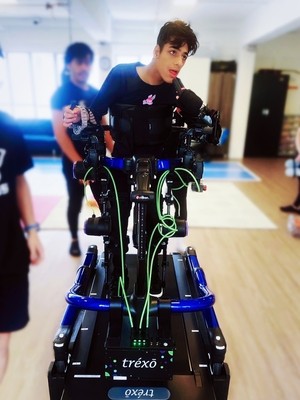
Robotic-Assisted Gait Training (RAGT) with TREXO ROBOTICS
RAGT is one of the latest, most cutting-edge technologies used in the world of physiotherapy for the rehabilitation of patients with conditions affecting neuromotor ability to improve their walking abilities.
Here at WINGS, we make use of the Trexo Plus to provide RAGT for our patients who require high levels of facilitation and support during their gait training sessions. Using the power of constant, repetitive motion, this method of Gait Training makes use of the power of neuroplasticity to strengthen the relationship between your child’s brain and muscles to learn proper gait patterns.
The Trexo Plus consists of wearable robotic legs that attach to a Rifton Pacer. The device is safe and mobile, allowing a child to experience over-ground walking independently. The unique ankle design provides the capability for the user to engage their muscles by pushing themselves forward. Early research indicates that, in conjunction with therapy, utilization of robotic gait training induces improvements in functional activities and gait pattern.
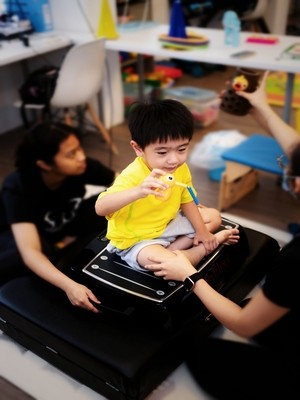
Vibration Therapy (VT) with GALILEO
VT uses a body vibration plate as a medium during physiotherapy sessions to either apply vibration on the whole body or to target specific muscle groups based on the goals of the patient and therapist.
Scientific evidence has shown that VT improves neuroplasticity, increases muscle contractions, accelerates brain-muscle neural communication, and leads to bigger muscle strength.
Here at WINGS, we are trained by BMEC to use the Galileo Vibration Plate for our sessions.
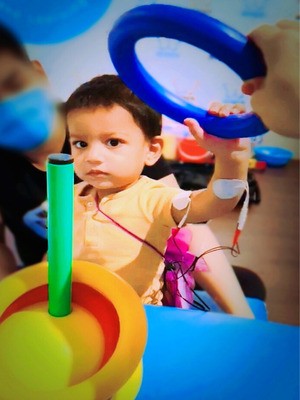
Functional Electrical Stimulation (FES) with NeuroTrac ®
FES is evidence-based, for children or adults with cerebral palsy.This method activates muscles and provides sensory and motor input, as well as awareness to the user. This increased muscle awareness and ability of the muscle to contract facilitates improved muscle and movement function as:
🦋 Range Of Motion In Joints Increases
🦋 Muscles Become More Active
🦋 Repetition Of Movement Coupled With Electric Stimulation Builds Muscular Memory For Target Muscle Groups To Activate For Completing A Task
FES is used to provide sensory and motor input during muscular contractions– stimulating unused or weak muscles during performances of functional tasks. It can activate muscles and create awareness of movement.
A remote switch is used during dynamic activity to assure the needed or typical timing of the stimulation. The therapist needs to consider the biomechanics and kinesiology of the activity and muscles involved when deciding which muscle to stimulate in what position and at what time.
The goal is that the user learns from sensory and motor input during muscle contraction through electrical stimulation. The simulation is felt by the child to learn that the muscle is there and can be used.
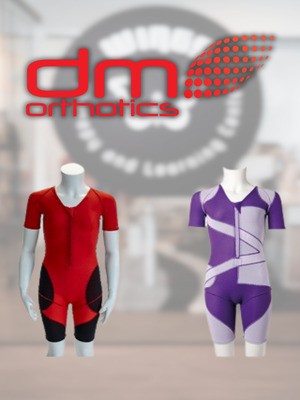
DM Orthotics ® (DMO)
The DMO uses biomechanical-paneling and strategic reinforcements to improve postural alignment and increase proprioception. These factors then stimulate and adjust the neurosensory system training muscles to work with improved tone, strength and performance.
DMO helps both adults and children manage the physical effects of their neurological, musculoskeletal and genetic conditions such as Cerebral Palsy, Stroke, Multiple Sclerosis, Scoliosis, Ehlers-Danlos Syndromes and more. The majority of DMO orthoses are made from a light-weight breathable material that is fully machine washable and available in a range of colours.
DMO also has a new range of products called DMO Essentials which offer similar benefits to our DMO® Custom made-to-measure products but in a range of pre-determined sizes.
WINGS are specially trained and certified to prescribe DM ORTHOTICS suits.
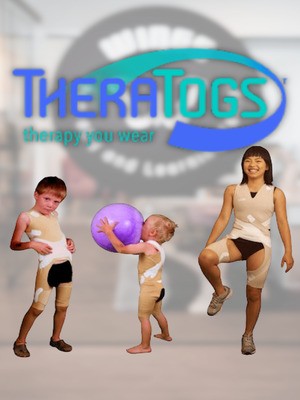
THERATOGS
TheraTogs were designed by paediatric physical therapist Beverly “Billi” Cusick, PT, MS, C/NDT, COF, to extend and promote clinical changes for children with neuromotor dysfunction. By improving postural control, the somatosensory system is activated. Improved trunk control leads to improved limb use.
Matching clinical function and clinical goals to a dynamic and versatile system allows children (and adults) with neuromotor dysfunction to be individuals who can move with better control and expend less energy doing so.
Therapy Approaches:
🦋 Movement System ('Impairment Syndrome') Analysis and Management
🦋 Proprioceptive Neuromuscular Facilitation (PNF)
🦋 Neurodevelopmental Treatment (NDT)
🦋 Perception-Action Approach (P-A) (formerly TAMO – Tscharnuter Akademie for Motor Organization)
🦋 Sensory Integration (SI) Approach
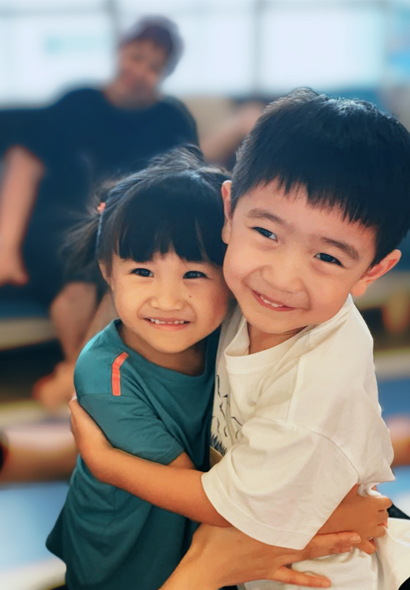
Everyone is welcome here.
We treat a broad range of conditions, and together, we’ll find the best approach to help
your child transforms their life with innovative and safe therapies and tools.
From initial evaluation to goal setting, and take-home exercise routines, you and your family are a vital part of our fun and challenging program. Our intensive programme typically lasts from 1 to 4 hours a day, 5 days a week for 3 – 4 weeks. During each Intensive, we treat the child holistically addressing gross motor, fine motor, social awareness skills all through an interactive play-based approach. Together, we help our patients achieve amazing things while helping babies, children and young adults avoid painful, future surgeries.
WINGS pushes so-called boundaries by constantly engaging and challenging our patients. On the road to freedom and independence, our team provides daily intensive therapy, no matter what challenges lay ahead.
